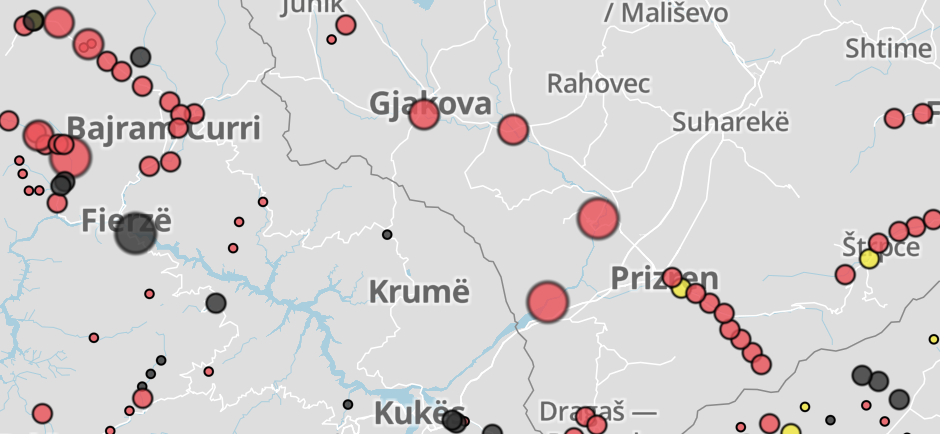
The interactive map to explore the region in detail based on different criteria.
 Save the Blue Heart of Europe - A campaign for the protection of Balkan Rivers
Save the Blue Heart of Europe - A campaign for the protection of Balkan Rivers
 The September print edition of the renowned German magazine GEO featured an article about the GEO Days of Biodiversity at the Vjosa River in Albania. Now, the article went online: Europas letzter wilder Fluss
The September print edition of the renowned German magazine GEO featured an article about the GEO Days of Biodiversity at the Vjosa River in Albania. Now, the article went online: Europas letzter wilder Fluss
Since it is only available in German read a partial translation here:
Europe’s last wild river
The Vjosa River in Southern Albania is the last untamed river of Europe. It provides habitat to many rare animal and plant species. Biologist explored its impressive abundance of species at the GEO Days of Biodiversity in the summer of 2014.
On the Balkan Peninsula they still exist – rivers that are still allowed to grub their path unhindered through canyons, valleys and plains on their path from the mountains to the sea.
The Vjosa River in Southern Albania is among these rivers. Along its course of over 270 kilometers – from the border mountains down to its delta at the Adriatic Sea – the Vjosa cleaves its way untamed.
 The gravel bed, through which the Vjosa’s course flip-flops through the valley, expands over more than 2 km in width: no dyke, no wall, no dam confines its path. Instead: natural cob walls, providing nesting spots for sand martins and bee-eaters. Temporarily dried up islands and riverbanks, on which tamarisk trees and shrub planes blossom; oxbows and backwaters where tadpoles scurry, juvenile fish swarm and dragon flies buzz. Every piece of dead wood, every turned stone crawls with life.
The gravel bed, through which the Vjosa’s course flip-flops through the valley, expands over more than 2 km in width: no dyke, no wall, no dam confines its path. Instead: natural cob walls, providing nesting spots for sand martins and bee-eaters. Temporarily dried up islands and riverbanks, on which tamarisk trees and shrub planes blossom; oxbows and backwaters where tadpoles scurry, juvenile fish swarm and dragon flies buzz. Every piece of dead wood, every turned stone crawls with life.
In order to keep it this way, a group of about 40 scientists, students, and conservationists met in the small village of Poçem at the Vjosa’s banks on a weekend in June. In the context of the GEO Days of Biodiversity, experts from Albania and Macedonia, from France, Austria and Germany are trying to get an idea of the biodiversity of this largely unexplored river. The biologist Ulrich Eichelmann from Vienna, whose organisation Riverwatch persistently fights for the preservation of Balkan rivers initiated the gathering: “Up to now, we might know more about the biodiversity of the Amazon than about the Vjosa – the last big unspoiled river in Europe”, so Eichelmann.
In cooperation with the foundation EuroNatur and the Albanien Society for the Preservation and Protection of Natural Environment (PPNEA), Eichelmann wants to have the Vjosa declared as a national park – so it can remain free of hydropower plants, the greatest threat for river habits on the Balkans. Over 570 dams are projected to be built across the region in the next years, eight thereof along the Vjosa. The riparian states have high hopes for renewable energy from hydropower. In the process, they run risk of destroying ecosystems that are without par on our continent. 80 per cent of the bigger rivers and creeks on the Balkan Peninsula are still in a very good or good condition. Through the campaign “Save the Blue Heart of Europe”, the conservationists aim to preserve at least the most valuable ones.
 The teams of the Vjosa Geo Days discovered a total of over 370 species, among them 80 spider species, 30 butterfly species, about 150 species of aquatic insects as well as numerous terrestrial insects, and some 50 bird species. The biggest of them made its appearance at the very end of the Biodiversity Days: on Sunday, a vulture suddenly glides majestically above the Vjosa near Tepelena: a rare Egypian Vulture – only a dozen breeding pairs of which live in Albania today. Today it is still circling above an untouched river landscape. But time is short to guard this treasure. A first dam project on the Vjosa is already under construction near Kalivaç – it is only due to falling prices for power producers since the financial crisis that constructions have been on hold for years.
The teams of the Vjosa Geo Days discovered a total of over 370 species, among them 80 spider species, 30 butterfly species, about 150 species of aquatic insects as well as numerous terrestrial insects, and some 50 bird species. The biggest of them made its appearance at the very end of the Biodiversity Days: on Sunday, a vulture suddenly glides majestically above the Vjosa near Tepelena: a rare Egypian Vulture – only a dozen breeding pairs of which live in Albania today. Today it is still circling above an untouched river landscape. But time is short to guard this treasure. A first dam project on the Vjosa is already under construction near Kalivaç – it is only due to falling prices for power producers since the financial crisis that constructions have been on hold for years.